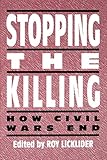Stopping the Killing : How Civil Wars End / Roy Licklider.
Material type: TextPublisher: New York, NY : New York University Press, [2020]Copyright date: ©1993Description: 1 online resourceContent type:
TextPublisher: New York, NY : New York University Press, [2020]Copyright date: ©1993Description: 1 online resourceContent type: - 9780814750704
- 9780814765425
- JX4541 .S84 1993
- online - DeGruyter
| Item type | Current library | Call number | URL | Status | Notes | Barcode | |
|---|---|---|---|---|---|---|---|
 eBook
eBook
|
Biblioteca "Angelicum" Pont. Univ. S.Tommaso d'Aquino Nuvola online | online - DeGruyter (Browse shelf(Opens below)) | Online access | Not for loan (Accesso limitato) | Accesso per gli utenti autorizzati / Access for authorized users | (dgr)9780814765425 |
restricted access online access with authorization star
http://purl.org/coar/access_right/c_16ec
Yugoslavia, Rwanda, Liberia, Somalia, Azerbaijan, El Salvador, Northern Ireland, Lebanon, Cambodia -- all provide bloody evidence that civil wars continue to have a powerful impact on the international scene. Because they tear at the very fabric of a society and pit countryman against countryman, civil wars are often the most brutal and difficult to extinguish -- witness the American Revolution. And yet, civil wars do inevitably end. England is no longer criss-crossed by warring armies representing York and Lancaster or King and Parliament. The French no longer kill one another over the divine right of kings. Argentines seem reconciled to living in a single state, rather than several. The ideologies of the Spanish Civil War now seem largely irrelevant. And the possibility of Southern secession is an issue long-buried in the American past. The question then begs itself: how do people who have been killing one another with considerable enthusiasm and success come together to form a common government? How can individuals and factions work together, politically and economically, with others who have killed their friends, parents, children and lovers? How are armed societies disarmed? What effect does a total military victory have on a lasting peace? In sum, how are civil societies constructed from civil violence and chaos? This is the central concern of Stopping the Killing.In this highly original and much needed volume, a distinguished group of experts on civil wars discuss both specific conflicts and broader theoretical issues. Individual chapters examine civil wars in Colombia, the Sudan, Yemen, America, Greece, and Nigeria, and analyze the causes of peace, the relationship between the battlefield and the negotiating table, and issues of settlement. An introduction and conclusion by the editor unify the volume. Contributors include: Jonathan Hartlyn (Univ. of North Carolina), Caroline Hartzell (Univ. of California, Davis), Jane E. Holl (U.S. Military Academy), John Iatrides (Southern Connecticut State University), James O'Connell (University of Bradford), Donald Rothchild (Univ. of California, Davis), Stephen John Stedman (Johns Hopkins Univ.), Robert Harrison Wagner (Univ. of Texas, Austin), Harvey Waterman (Rutgers Univ.), Manfred Wenner (Northern Illinois Univ.), and I. William Zartman (Johns Hopkins Univ.).
Mode of access: Internet via World Wide Web.
In English.
Description based on online resource; title from PDF title page (publisher's Web site, viewed 01. Nov 2023)


